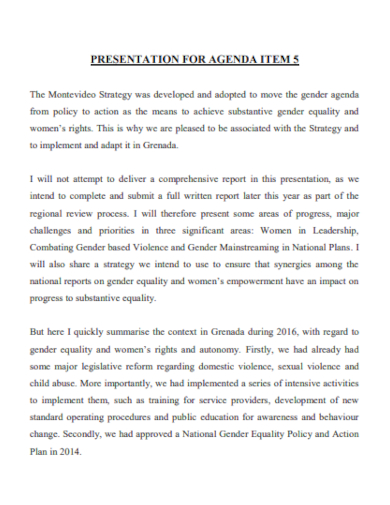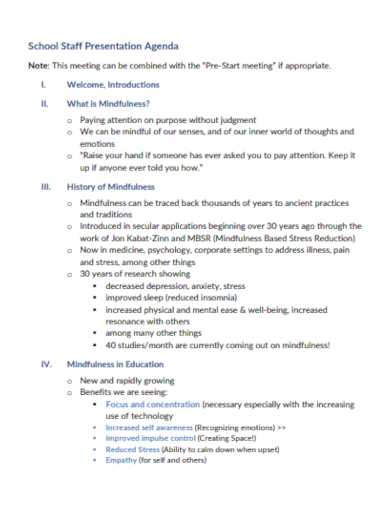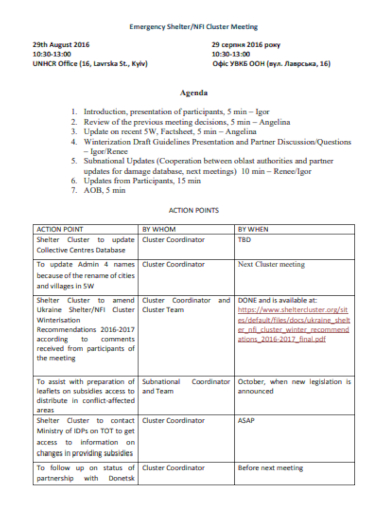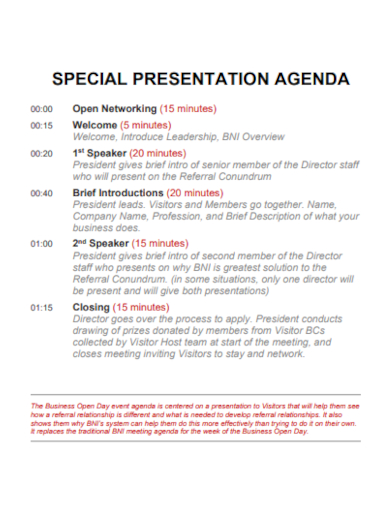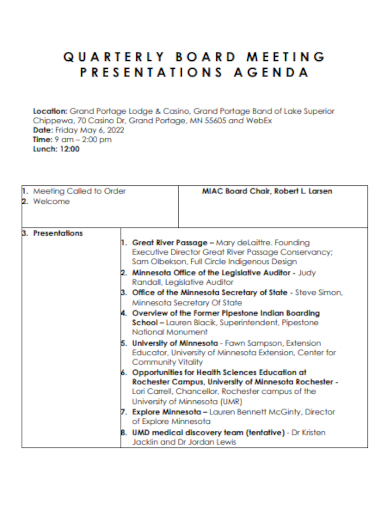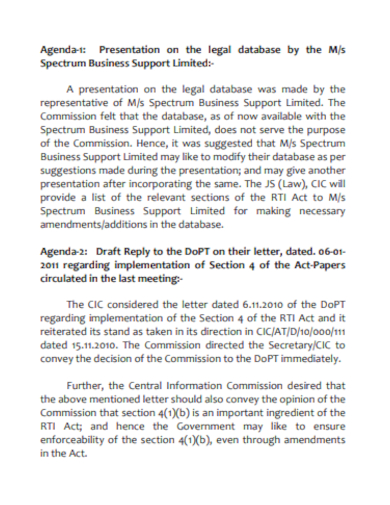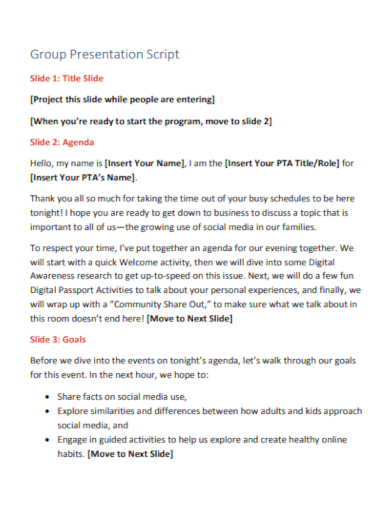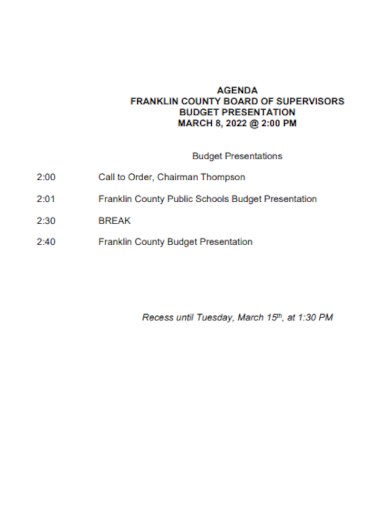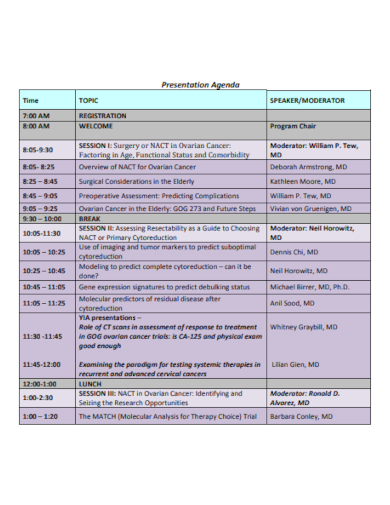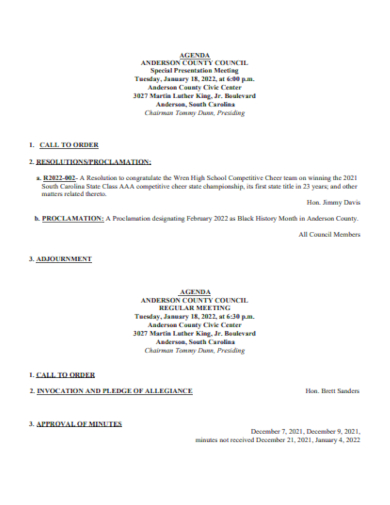The introduction section of the presentation agenda is where the presenter sets the stage for the presentation. The presenter may provide a sample project overview of the presentation, a brief background of themselves, and the main professional goals and objectives of the presentation. This section is important because it helps the audience understand what to expect and why they should pay attention to the presentation.
10+ Presentation Agenda Samples
1. Agenda 21 Presentation Template
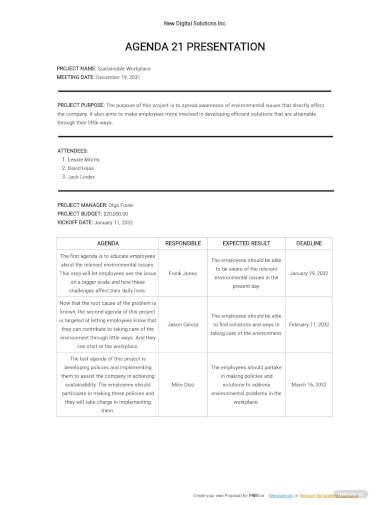
2. Presentation for Agenda Item
3. School Staff Presentation Agenda
4. Cluster Meeting Presentation Agenda
5. Special Presentation Agenda
6. Board Meeting Presentation Agenda
7. Legal Presentation Agenda
8. Group Presentation Script Agenda
9. Budget Presentation Agenda
10. Sample Presentation Agenda
11. Special Presentation Meeting Agenda
What is Presentation Agenda?
A presentation agenda is a vital component of any successful presentation. It is an outline or planner samples that provides structure and direction for the presentation, ensuring that the audience understands the flow and purpose of the presentation. A presentation agenda can be broken down into several sections, including an introduction, main topics, conclusion, and Q&A.
How To Make Presentation Agenda?
Making a presentation agenda is a simple but important process that can help you organize your presentation and ensure that it is effective in communicating your message to your audience. Here are some steps to follow when making a presentation agenda:
Step 1- Determine Objectives
Before creating your presentation agenda, you should first determine your objectives for the presentation. What is the purpose of your presentation? What do you hope to achieve by the end of it? This will help you decide what topics to cover and how to structure your presentation.
Step 2- Identify Main Topics
Once you have your objectives, identify the main topics you want to cover in your presentation. You can create a list of topics, subtopics, and key points that you want to make in each section. This will help you organize your presentation and ensure that you cover all the important information.
Step 3- Order Your Topics
Once you have identified your main topics, decide on the order in which you want to present them. This can be based on the logical flow of the presentation, the level of importance of each topic, or any other factors that you think are relevant.
Step 4- Create an Outline
Use the list of topics and their order to create an outline for your presentation. This can be a simple bulleted list or a more detailed document that includes subheadings and key points. The outline should provide a clear and concise overview of what you will cover in your presentation.
Should a presentation agenda be shared with the audience?
Yes, a presentation agenda should be shared with the audience before the presentation begins. This helps the audience understand what to expect and provides a roadmap for the presentation.
Can a presentation agenda be modified during the presentation?
Yes, a presentation agenda can be modified during the presentation if necessary. The presenter may need to adjust the order of the topics or add or remove items based on audience feedback or time constraints.
Is a presentation agenda necessary for all types of presentations?
While a presentation agenda is not strictly necessary for all types of presentations, it can be helpful in organizing the presenter’s thoughts and ensuring that the presentation is focused and effective in communicating its message to the audience.
In conclusion, a presentation agenda is a critical component of any successful presentation. It provides structure and direction for the presentation, ensuring that the audience understands the flow and purpose of the presentation. The introduction, main topics, conclusion, and Q&A sections of the presentation agenda work together to create a roadmap for the presentation that ensures all key points are covered and that the audience is engaged and informed. A well-planned and executed presentation agenda can make the difference between a forgettable presentation and one that leaves a lasting impression.
Related Posts
FREE 10+ Family Meeting Agenda Samples in PDF
FREE 10+ Day Agenda Samples in MS Word | Pages | Google Docs | PDF
FREE 10+ Program Agenda Samples in PDF
FREE 10+ Committee Meeting Agenda Samples in MS Word | Pages | Google Docs | PDF
FREE 6+ Wedding Agenda Samples in MS Word | PDF
FREE 10+ Retreat Agenda Templates in PDF | MS Word
FREE 18+ Safety Agenda Samples & Templates in MS Word | PDF
FREE 10+ Board Agenda Samples & Templates in PDF | MS Word
FREE 10+ Interview Agenda Samples and Templates in PDF | MS Word
FREE 7+ Travel Agenda Samples and Templates in PDF
FREE 10+ Project Agenda Samples and Templates in PDF | MS Word
FREE 12+ Sales Agenda Templates in PDF | MS Word
FREE How Meeting Agendas Result in Actionable Productivity [ Making Your Meeting Agenda ]
FREE First Advisory Board Meeting Agenda [ Importance and Tips ]
FREE Strategies to Overcome the Risk to Your Company’s Agenda [ Definition, Steps for Overcoming Risks ]

